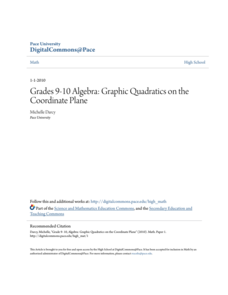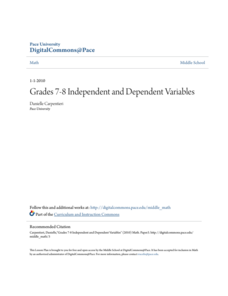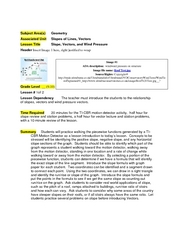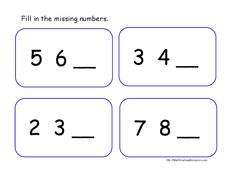EngageNY
Determining the Equation of a Line Fit to Data
What makes a good best-fit line? In the 10th part of a 16-part module, scholars learn how to analyze trend lines to choose the best fit, and to write equations for best-fit lines to make predictions.
EngageNY
Numbers in Exponential Form Raised to a Power
Develop an understanding of the properties of exponents through this series of activities. This third lesson of 15 explores the patterns associated with the power property. Scholars expand the powers before applying the property.
EngageNY
Negative Exponents and the Laws of Exponents
Apply the properties of exponents to expressions with negative exponents. The fifth lesson in the series explains the meaning of negative exponents through an exploration of the properties taught in the previous lessons of the...
EngageNY
Magnitude
Build an understanding of the powers of 10. Pupils investigate the results of raising 10 to positive and negative powers. They relate this understanding to the magnitude these powers represent in this seventh lesson of 15.
EngageNY
Scientific Notation
Young mathematicians learn how scientific notation is meant to save time. Part 10, out of a series of 15, asks scholars to recognize the correct use of scientific notation and finish by adding and subtracting numbers using...
EngageNY
Definition of Translation and Three Basic Properties
Uncover the properties of translations through this exploratory instructional activity. Learners apply vectors to describe and verify transformations in the second installment of a series of 18. It provides multiple opportunities to...
EngageNY
Solving Equations with Radicals
Show learners how to develop a procedure for solving equations using radicals with the fifth lesson plan of the 25-part module that challenges learners to use properties to solve multi-step quadratic and cubic equations. Individuals...
EngageNY
Decimal Expansions of Fractions, Part 1
Is it possible to add infinitely long decimals? As pupils complete the examples in the ninth lesson of this 25-part series, they determine that adding these decimals cannot be done without error. Their task is then to determine the size...
EngageNY
Decimal Expansions of Fractions, Part 2
Develop your pupils' understanding of fractions and their decimal equivalence using the 12th lesson in this series. Scholars learn an alternative to long division that results in converting fractions to decimals that emphasize fractional...
EngageNY
An Exercise in Creating a Scale Drawing
Design your dream classroom. The lesson plan contains an exercise to have teams create a scale drawing of their dream classroom. Pairs take the measurements of their classroom and furniture and create a scale factor for them. To finish...
Scholastic
Study Jams! Proportions
Join Zoe and Sam as they use proportions to budget money for their Green Earth Club. Watch as they set up and solve a series of proportions using cross multiplication and division. A great resource that brings together prior knowledge of...
Curated OER
Introduce Vocabulary: Kindergarten Count to 100
During read-aloud of Kindergarten Count to 100 by Jacqueline Rogers, children listen for context clues about vocabulary that includes the words "first," "second," and "third." I love the way vocabulary development skills are integrated...
Curated OER
Carnival Tickets
A great subtraction and division discovery opportunity for young mathematicians, this learning task involves seven word problems that require multiple steps. Learners use a math table to persevere in solving problems that are...
Curated OER
Number Rods
Working in a math center or an "I finished early" work station, young mathematicians will match in sequence pre-set-up rods of unifix cubes to numbers on a number line. To help differentiate tens from ones, use different colors to...
Flipped Math
Calculus AB/BC - The Fundamental Theorem of Calculus and Accumulation Functions
Connect integrals with differentiation. The beginning of the video introduces the definition of an accumulation function. Scholars learn about the relationship between integrals and derivatives. Using what is commonly known as Part Two...
Pace University
Grades 9-10 Algebra: Graphic Quadratics on the Coordinate Plane
Find quadratics in the world. Learners select ways to compare and contrast linear and quadratic functions and how to demonstrate knowledge of parabolas in the world. Teachers assign a third task challenging individuals to find equations...
Pace University
Grades 7-8 Mean, Median, and Mode
Take a central look at data. The differentiated lesson provides activities for pupils to calculate central tendencies. Scholars begin choosing three central tendency activities from a Tic-Tac-Toe board. Learners then choose from sports,...
Pace University
Grades 7-8 Independent and Dependent Variables
It all depends upon the independence. The differentiated instruction lesson introduces learners to independent and dependent variables. Using real-world situations, scholars gain a conceptual understanding of the difference between the...
Pace University
Grade 7 Earth Day Statistics with Circle and Bar Graphs
Take a tiered approach to studying waste. The lesson uses Earth Day to present differentiated instruction around using circle and bar graphs. Each group gets a cube based on their tiers and works collaboratively as well as individually...
College Board
2006 AP® Calculus BC Free-Response Questions Form B
Go a little deeper. Learners use the released 2006 AP® Calculus BC free-response questions to review for the BC test, which covers content from Calculus AB and Calculus BC. Topics include volumes of revolution, particle motion,...
Curated OER
Zeros of a Cubic
Mathematicians explore cubic functions by learning how to investigate the relationship between the x-coordinates of the three zeros of a cubic function. The instructional activity also contains an application of differentiation.
Curated OER
Slope, Vectors, and Wind Pressure
A hands-on lesson using the TI-CBR Motion Detector to provide information to graph and analyze. The class uses this information to calculate the slope of motion graphs and differentiate scalar and vector quantities. There is a real-world...
Curated OER
Fill in the Missing Numbers
What comes next? Drill your new counters as they fill in a blank space when given two consecutive numbers. Each page features four sets of numbers, and learners fill in the third of the series. Differentiate by having beginners fill in...
Curated OER
Where We Live
Who has the most? Young learners practice charting data using familiar information. They help fill out a classroom chart by recording the number of people, pets, televisions, etc. in their home. Guiding questions help them investigate...























